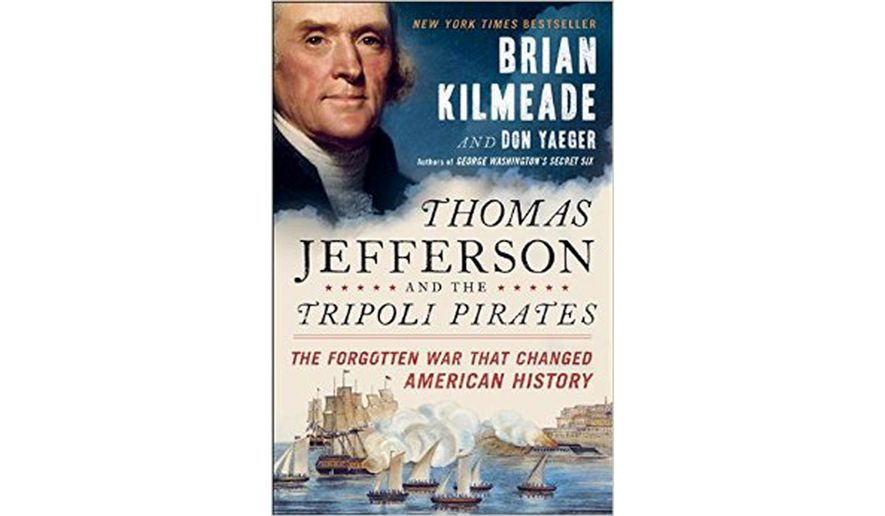OPINION:
THOMAS JEFFERSON AND THE TRIPOLI PIRATES; THE FORGOTTEN WAR THAT CHANGED AMERICAN HISTORY
By Brian Kilmeade and Don Yaeger
Sentinel, $27.95, 238 pages
As a scholarly truism holds, “every generation rewrites history to suit itself,” the same might be said for every historian, and every news anchor who wants to be one. Brian Kilmeade of “Fox and Friends” (with ghostwriter Don Yaeger), gave us “George Washington’s Secret Six” and now has penned another look at our Republic’s early years through a lens ground to his own prescription.
This is not to say that all views here are uniquely skewed, for President Jefferson’s Barbary Wars launched the young nation on an unexpected course and proved our Navy’s strength, which a decade later enabled us to beat Britain in the War of 1812 and really change history. But this is to say that the authors let historical idealism bend their narrative, and that they admit a hidden motive for the entire exercise only two pages before the epilogue.
Facts or nuances are often fudged to accelerate a narrative’s pace; so be it. But it seems disingenuous to hold back a book’s core thesis until a peroration declares: “Most important, here in the twenty-first century, the broader story — the great confrontation between the United States and militant Islamic states — has a new significance.” That notion strains credibility, because real similarities between the historical “then” and the international “now” are as thin as parchment.
Perhaps I infer too much, or perhaps the book became a best-seller because it feeds a genuine popular interest in America’s relations with the nations of North Africa. But while nothing succeeds like success, I still smell a jingo. This is cherry-picking history to suit a modern agenda. Example: It opens in 1785 with Jefferson accepting the post as minister to France in order, the authors say, to ease his melancholy over his wife’s death three years earlier. Not a word about Sally Hemmings, the household slave he brought to Paris as his daughter’s servant and took home as his concubine.
The turn of the 19th century was a very different time, and the world a different place. Before steamships and telegraphy, distant events unfolded at a snail’s pace as news and messages took months to cross oceans. Slavery was widespread and one “moral” cause of our fight was the Barbary pirates’ capture of American ships and their enslavement of American seamen, a bigoted practice based on their being Christians (while slavery in America was based on alleged racial inferiority. Go figure.) In those days American “officers and gentlemen” killed each other ritually to settle personal disputes; Commodore Stephen Decatur, a hero of Tripoli, would die in a duel years later.
The Barbary States — Morocco, Algiers, Tunis and Tripoli — were rogue remnants of the mighty Ottoman Empire. But in Jefferson’s day their perennial piracy was infamous as they preyed on European shipping unless their governments paid tributes to buy safe passage through the waters straddling Gibraltar. Not able to afford to follow suit, America, an upstart nation, struck a blow for the freedom of the seas and in the end won a bargain with the piratical Moors.
Mr. Kilmeade and Mr. Yaeger rightly depict the Barbary Wars as slow in coming, untidy in waging, long in playing out and punctuated with moments of spectacular valor. After the frigate Philadelphia was lured into shallow waters by a pirate and struck a reef, Lt. Decatur saved her from being taken as a prize by leading a night raid to torch the vessel. Hand-to-hand combat with sabers, scimitars, pikes and bayonets was common as our sailors and Marines manned nimble gunboats to board enemy ships. The soldier-diplomat William Eaton, who proclaimed himself a general and commander in chief, led seven Marines and 400 mercenaries on a two-month march to attack the fortified port city of Derne, then trek to Benghazi. Here lay, after all, the storied “shores of Tripoli” where, as the Marine Corps Hymn declaims, the Corps earned its stripes.
If the Barbary Wars offer a coda to be reprised as history repeats itself, perhaps it is in Eaton’s plan to oust one hostile prince and seat a friendlier ruler on the throne. Or in the ceremonial dress swords Marine officers still wear, weapons modeled after the one Lt. Presley O’Bannnon received for taking Derne and raising the American flag in victory on foreign soil for the first time.
In this account sentimentality competes with valor and wins; patriotic hyperbole beats historical exposition. In describing wars that were largely maritime, the authors founder as they describe a vessel “at full sail” and “cannon mounted at the front of the ship” and Philadelphia leaning “sharply to one side.” They pluck at our patriotic heartstrings invoking Jefferson as he considers bringing his daughter across an ocean teeming with pirates who sell their pretty captives into fates proverbially worse than death: “As a father he could feel in his bones a fear for his daughter’s safety. As an ambassador and an American, Jefferson recognized it was a fear no citizen of a free nation embarking on an oceanic voyage should have to endure.” Call it patriotic drum-thumping or history lite.
• Philip Kopper, author and publisher of Posterity Press, Inc., is a descendant of a U.S. Marine sergeant who fought in the Barbary Wars off “the shores of Tripoli.”




Please read our comment policy before commenting.